9年级英语一课一练
- 格式:docx
- 大小:9.25 KB
- 文档页数:6
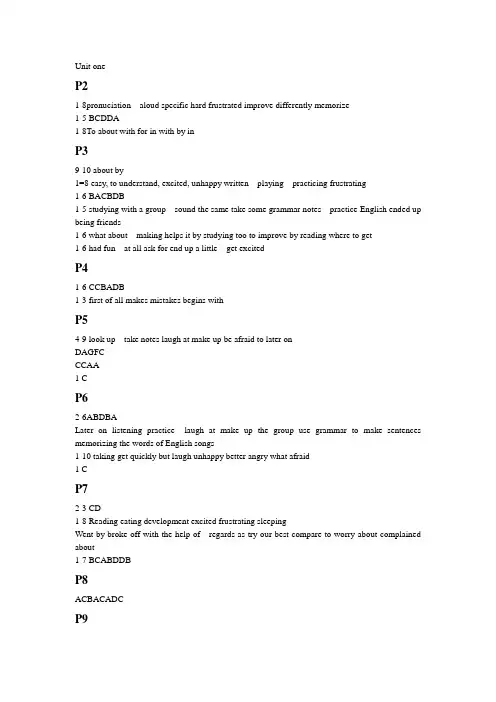
Unit oneP21-8pronuciation aloud specific hard frustrated improve differently memorize1-5 BCDDA1-8To about with for in with by inP39-10 about by1=8 easy, to understand, excited, unhappy written playing practicing frustrating1-6 BACBDB1-5 studying with a group sound the same take some grammar notes practice English ended up being friends1-6 what about making helps it by studying too to improve by reading where to get1-6 had fun at all ask for end up a little get excitedP41-6 CCBADB1-3 first of all makes mistakes begins withP54-9 look up take notes laugh at make up be afraid to later onDAGFCCCAA1 CP62-6ABDBALater on listening practice laugh at make up the group use grammar to make sentences memorizing the words of English songs1-10 taking get quickly but laugh unhappy better angry what afraid1 CP72-3 CD1-8 Reading eating development excited frustrating sleepingWent by broke off with the help of regards as try our best compare to worry about complained about1-7 BCABDDBP8ACBACADCP91-8 Easily friendship lose solve best influence unless regard1-6 CDBADB1-4 ACDBP111-6 DCBDBB1-8 terrified more outgoing seeing didn’t know work interested being to keep1-6 have short hair on the school basketball team did use to Be sure to with his eyes open has changed a lot1-3 DAGP124-5CE1-8 airplane sleep team quiet serious change differently straight1-8 terrified staying at home alone keep on used to walk ended up cooking hanging out frustrating by listening to tapes spent on is interested in1-6 about/on on the desk with in his hand be afraid of get used to meeting her outgoing friendly to1-5 BEACDP 131-6 DBCDBB1-9 go to seep have to mind worry about used to be afraid of daily so much hardly ever1-5 gym class paint pictures walk to spending all day chewing gumP146-8 to wash your hands more outgoing with the help of1-4 ADAD1-6 DDBDAD1-6 on foot spent flying on team no more instead of it seems that1-2 did use to be yes, I did what did useP153-5 didn’t use to used to enjoy didn’t he1-10 fly never traveling off when keep board what police nothing1-6 DDDCBC1-5 doesn’t anymore seems to dislike used to be on makes me very relaxed in the past ten years1-2 BA3-15 CCD BADCB BBADC1-4 CABBP171-8 Waste decision patient caused himself surprise afford necessary1-10 give up gets into trouble even though take pride in make a decision to our surprise in the end pay attention to any longer all the time1-5 FECDBP191-6 BDDCAA1-8 should be allowed sill y get their ears pierced instead of so do we stay up late right decision agree with1-9 DIAGFBEHC1-8 pierced be planted to rain to put on disagree 16-year-olds buying to hold1-2 ABP203-6DABA1-6 crying be changed build going on two-week1-6 be allowed a twelve-year-old girl not old enough to instead of so does my brother it seems that have1-5 DGAECP211-8 present opportunity member designed experience local volunteer probably1-6 ADCCDB1-8 worry about fail the test get to class take the test quiet strict with us wear uniforms the other day stay upP221-15 CADBC CADBB ABDAB1-6 CAACAB1-6 concentrates on the other day passed the test instead of get noisy a great experience1-3 be allowed to replied to spend this weekend4-8 doesn’t seem to have achieve your dreams watching tv too much have a day off have an opportunity to go1-4 CADB1-8 keeping more comfortable doing be allowed to reply volunteering made sleepy1=5 should be allowed shouldn’t be allowed don’t should be done should be cleaned trees are planted1-2 FDP243-5 AGC1-4 comfortable athletes achieve raceP255-6 importance obey1-8 succeed designed local perform realistic points experience building1-10 another wear order heads agreement change clean difficult if allowed 1-5 CEGAD。
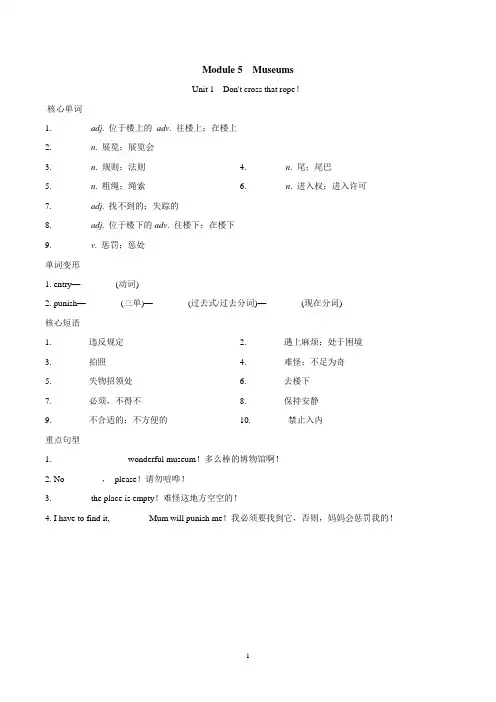
Module 5MuseumsUnit 1Don't cross that rope!核心单词1. ________ adj. 位于楼上的adv. 往楼上;在楼上2. ________ n. 展览;展览会3. ________ n. 规则;法则4. ________ n. 尾;尾巴5. ________ n. 粗绳;绳索6. ________ n. 进入权;进入许可7. ________ adj. 找不到的;失踪的8. ________ adj. 位于楼下的adv. 往楼下;在楼下9. ________ v. 惩罚;惩处单词变形1. entry—________(动词)2. punish—________(三单)—________(过去式/过去分词)—________(现在分词)核心短语1. ________违反规定2. ________遇上麻烦;处于困境3. ________拍照4. ________难怪;不足为奇5. ________失物招领处6. ________去楼下7. ________必须,不得不8. ________保持安静9. ________不合适的;不方便的10. ________禁止入内重点句型1. ________ ________ wonderful museum!多么棒的博物馆啊!2. No ________,please!请勿喧哗!3. ________ the place is empty!难怪这地方空空的!4. I have to find it, ________ Mum will punish me!我必须要找到它,否则,妈妈会惩罚我的!Unit 2If you ever go to London,make sure you visit the Science Museum.核心单词1. ________n. 物理学2. ________ n. 实验3. ________ n. 沙;沙子4. ________ v. 操作;操纵5. ________ n. 卡车;货车6. ________ n. 轮子;车轮7. ________ n. (复数) 通信8. ________ n. 化学9. ________ n. X射线;X光10. ________ v. 挖掘;掘(洞)11. ________ n. 煤12. ________ n. 能量;能源13. ________ adj. 全部的;整个的单词变形1. wheel—________(复数)2. control—________(三单)—________(过去式/过去分词)—________(现在分词)3. dig—________(三单)—________(过去式/过去分词)—________(现在分词)核心短语1. ________ 物理实验2. ________ 把……用……装满3. ________ 弄清楚4. ________ 比较……与……5. ________ 所有年龄段的6. ________ 查明;确保7. ________ 成千上万的8. ________ 制造噪音重点句型1. For example, you can ________ ________ how people dig coal from the ground and use it to create energy.例如,你能弄清人们怎样从地下挖煤,并用它产生能量。
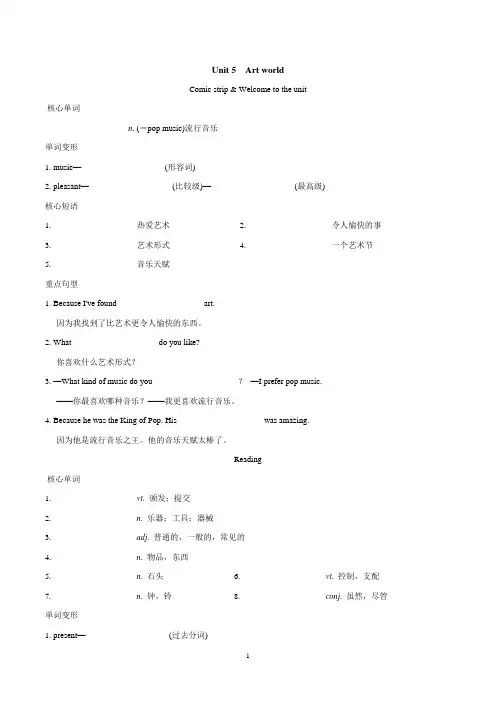
Unit 5Art worldComic strip & Welcome to the unit核心单词____________________n. (=pop music)流行音乐单词变形1. music—____________________(形容词)2. pleasant—____________________(比较级)—____________________(最高级)核心短语1. ____________________热爱艺术2. ____________________令人愉快的事3. ____________________艺术形式4. ____________________一个艺术节5. ____________________音乐天赋重点句型1. Because I've found ____________________ art.因为我找到了比艺术更令人愉快的东西。
2. What ____________________ do you like?你喜欢什么艺术形式?3. —What kind of music do you ____________________?—I prefer pop music.——你最喜欢哪种音乐?——我更喜欢流行音乐。
4. Because he was the King of Pop. His ____________________ was amazing.因为他是流行音乐之王。
他的音乐天赋太棒了。
Reading核心单词1. ____________________vt. 颁发;提交2. ____________________n. 乐器;工具;器械3. ____________________adj. 普通的,一般的,常见的4. ____________________n. 物品,东西5. ____________________n. 石头6. ____________________vt. 控制,支配7. ____________________n. 钟,铃8. ____________________conj. 虽然,尽管单词变形1. present—____________________(过去分词)2. centre—____________________(形容词)3. music—____________________(名词)4. win—____________________(动词的-ing形式)____________________(名词)5. successful—____________________(副词)6. tradition—____________________(形容词)7. west—____________________(形容词)8. boundary—____________________(复数)核心短语1. ____________________音乐无国界2. ____________________被颁发给某人3. ____________________一个世界闻名的作曲家4. ____________________在湖南中部5. ____________________对某事有兴趣6. ____________________乐器7. ____________________继续做某事8. ____________________用普通东西创作音乐9. ____________________慢慢了解10. ____________________因……而闻名11. ____________________通过控制……的速度12. ____________________水流13. ____________________一个古老的中国编钟14. ____________________混合到一起15. ____________________用一种西方的风格16. ____________________形成一个新的类型17. ____________________最伟大的作曲家之一18. ____________________在他的作品中19. ____________________为……作曲重点句型1. He loves ____________________ and the blowing wind because, to him, the best music ____________________.他喜欢流水的声音和风的吹拂,因为对他来说,最好的音乐来自大自然。
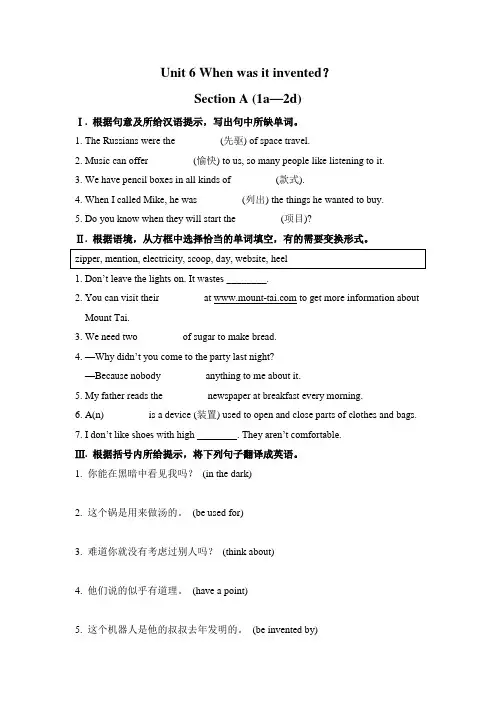
Unit 6 When was it invented?Section A (1a—2d)Ⅰ. 根据句意及所给汉语提示,写出句中所缺单词。
1. The Russians were the ________ (先驱) of space travel.2. Music can offer ________ (愉快) to us, so many people like listening to it.3. We have pencil boxes in all kinds of ________ (款式).4. When I called Mike, he was ________ (列出) the things he wanted to buy.5. Do you know when they will start the ________ (项目)?Ⅱ. 根据语境,从方框中选择恰当的单词填空,有的需要变换形式。
1. Don’t leave the lights on. It wastes ________.2. You can visit their ________ at to get more information about Mount Tai.3. We need two ________ of sugar to make bread.4. —Why didn’t you come to the party last night?—Because nobody ________ anything to me about it.5. My father reads the ________ newspaper at breakfast every morning.6. A(n) ________ is a device (装置) used to open and close parts of clothes and bags.7. I don’t like shoes with high ________. They aren’t comfortable.Ⅲ. 根据括号内所给提示,将下列句子翻译成英语。
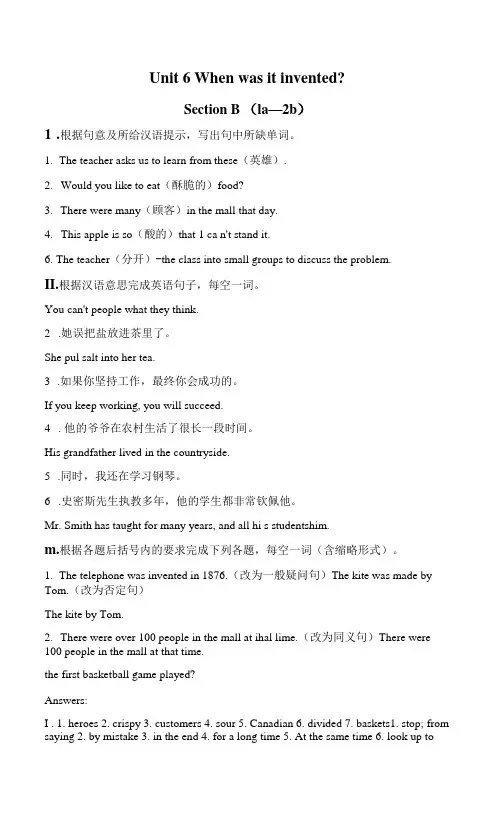
Unit 6 When was it invented?Section B (la—2b)1.根据句意及所给汉语提示,写出句中所缺单词。
1.The teacher asks us to learn from these(英雄).2.Would you like to eat(酥脆的)food?3.There were many(顾客)in the mall that day.4.This apple is so(酸的)that 1 ca n't stand it.6. The teacher(分开)-the class into small groups to discuss the problem.II.根据汉语意思完成英语句子,每空一词。
You can't people what they think.2.她误把盐放进茶里了。
She pul salt into her tea.3.如果你坚持工作,最终你会成功的。
If you keep working, you will succeed.4.他的爷爷在农村生活了很长一段时间。
His grandfather lived in the countryside.5.同时,我还在学习钢琴。
6.史密斯先生执教多年,他的学生都非常钦佩他。
Mr. Smith has taught for many years, and all hi s studentshim.m.根据各题后括号内的要求完成下列各题,每空一词(含缩略形式)。
1.The telephone was invented in 1876.(改为一般疑问句)The kite was made by Tom.(改为否定句)The kite by Tom.2.There were over 100 people in the mall at ihal lime.(改为同义句)There were 100 people in the mall at that time.the first basketball game played?Answers:I . 1. heroes 2. crispy 3. customers 4. sour 5. Canadian 6. divided 7. baskets1. stop; from saying 2. by mistake 3. in the end 4. for a long time 5. At the same time 6. look up toII. 1. Was; invented 2. wasn't made 3. more than 4. When was。
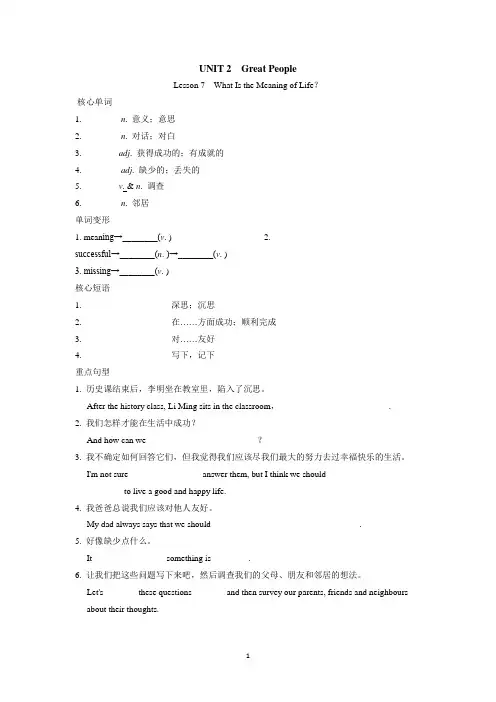
UNIT 2Great PeopleLesson 7What Is the Meaning of Life?核心单词1. ________ n. 意义;意思2. ________ n. 对话;对白3. ________adj. 获得成功的;有成就的4. ________ adj. 缺少的;丢失的5. ________v. & n. 调查6. ________ n. 邻居单词变形1. mean ing→________(v. )2.successful→________(n. )→________(v. )3. missing→________(v. )核心短语1. ____________________深思;沉思2. ____________________在……方面成功;顺利完成3. ____________________对……友好4. ____________________写下,记下重点句型1. 历史课结束后,李明坐在教室里,陷入了沉思。
After the history class, Li Ming sits in the classroom,________ ________ ________.2. 我们怎样才能在生活中成功?And how can we ________ ________ ________?3. 我不确定如何回答它们,但我觉得我们应该尽我们最大的努力去过幸福快乐的生活。
I'm not sure ________ ________answer them, but I think we should ________ ________ ________ to live a good and happy life.4. 我爸爸总说我们应该对他人友好。
My dad always says that we should ________ ________ ________ ________.5. 好像缺少点什么。
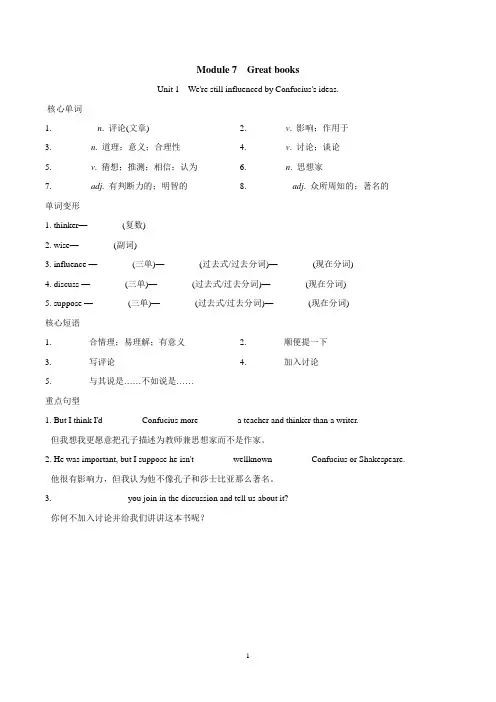
Module 7Great booksUnit 1We're still influenced by Confucius's ideas.核心单词1. ________ n. 评论(文章)2. ________ v. 影响;作用于3. ________ n. 道理;意义;合理性4. ________ v. 讨论;谈论5. ________ v. 猜想;推测;相信;认为6. ________ n. 思想家7. ________ adj. 有判断力的;明智的8. ________ adj. 众所周知的;著名的单词变形1. thinker—________(复数)2. wise—________(副词)3. influence —________(三单)—________(过去式/过去分词)—________(现在分词)4. discuss —________(三单)—________(过去式/过去分词)—________(现在分词)5. suppose —________(三单)—________(过去式/过去分词)—________(现在分词)核心短语1. ________合情理;易理解;有意义2. ________顺便提一下3. ________写评论4. ________加入讨论5. ________与其说是……不如说是……重点句型1. But I think I'd ________ Confucius more ________ a teacher and thinker than a writer.但我想我更愿意把孔子描述为教师兼思想家而不是作家。
2. He was important, but I suppose he isn't ________ wellknown ________ Confucius or Shakespeare. 他很有影响力,但我认为他不像孔子和莎士比亚那么著名。
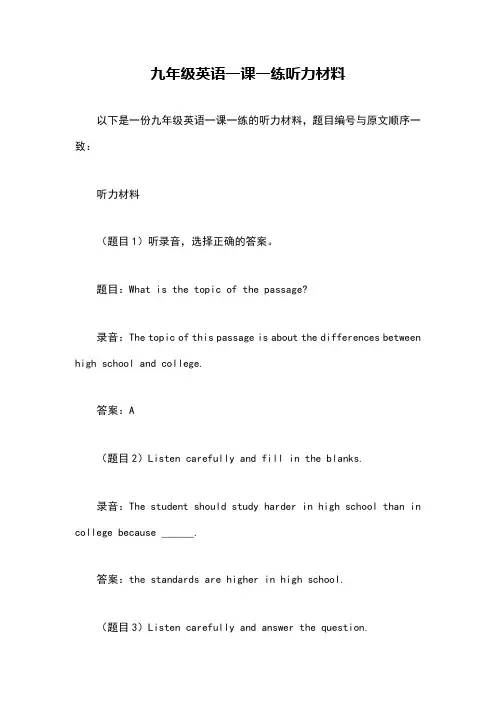
九年级英语一课一练听力材料以下是一份九年级英语一课一练的听力材料,题目编号与原文顺序一致:听力材料(题目1)听录音,选择正确的答案。
题目:What is the topic of the passage?录音:The topic of this passage is about the differences between high school and college.答案:A(题目2)Listen carefully and fill in the blanks.录音:The student should study harder in high school than in college because ______.答案:the standards are higher in high school.(题目3)Listen carefully and answer the question.录音:Do you think high school students should have more freedom than college students?答案:No, I don't think so. High school students need to learn more discipline and structure.听力材料续篇(题目4)Read the passage and answer the question.Question: What are the differences between high school and college?Answer: The main difference between high school and college is that students in college are usually more independent and have more freedom to choose their own classes and schedule, but high school students need to follow a more structured curriculum and adhere to a strict schedule.(题目5)Listen carefully and choose the correct word from the options.录音:In high school, students usually ______ more homework thanin college.答案:do听力材料续篇续篇(题目6)Listen carefully and fill in the blanks.录音:The main reason why high school students need to study harder is that ______.答案:the standards are higher in high school.(题目7)Answer the question after listening to the tape.Question: Do you think high school students should be more responsible for their own learning?Answer: Yes, I think so. High school students need to take more responsibility for their own learning because they are responsible for their own future success or failure.以上是一份九年级英语一课一练的听力材料,涵盖了听力选择、填空、回答问题和阅读理解等多种题型,旨在帮助学生提高英语听力和阅读理解能力。
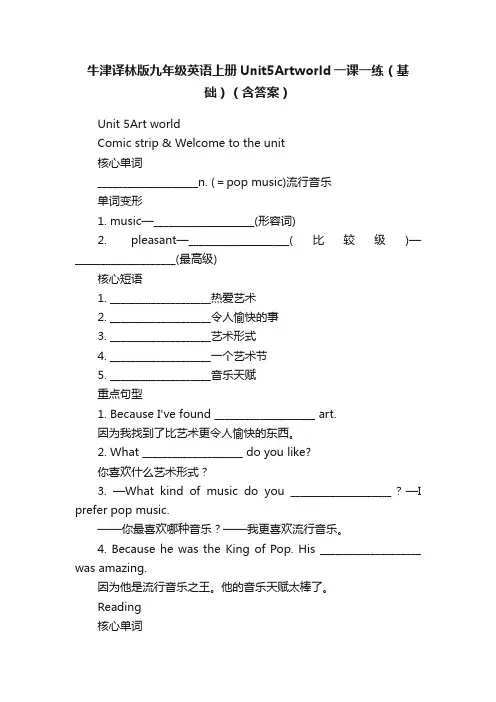
牛津译林版九年级英语上册Unit5Artworld一课一练(基础)(含答案)Unit 5Art worldComic strip & Welcome to the unit核心单词____________________n. (=pop music)流行音乐单词变形1. music—____________________(形容词)2. pleasant—____________________(比较级)—____________________(最高级)核心短语1. ____________________热爱艺术2. ____________________令人愉快的事3. ____________________艺术形式4. ____________________一个艺术节5. ____________________音乐天赋重点句型1. Because I've found ____________________ art.因为我找到了比艺术更令人愉快的东西。
2. What ____________________ do you like?你喜欢什么艺术形式?3. —What kind of music do you ____________________?—I prefer pop music.——你最喜欢哪种音乐?——我更喜欢流行音乐。
4. Because he was the King of Pop. His ____________________ was amazing.因为他是流行音乐之王。
他的音乐天赋太棒了。
Reading核心单词1. ____________________vt. 颁发;提交2. ____________________n. 乐器;工具;器械3. ____________________adj. 普通的,一般的,常见的4. ____________________n. 物品,东西5. ____________________n. 石头6. ____________________vt. 控制,支配7. ____________________n. 钟,铃8. ____________________conj. 虽然,尽管单词变形1. present—____________________(过去分词)2. centre—____________________(形容词)3. music—____________________(名词)4. win—____________________(动词的-ing形式)____________________(名词)5. successful—____________________(副词)6. tradition—____________________(形容词)7. west—____________________(形容词)8. boundary—____________________(复数)核心短语1. ____________________音乐无国界2. ____________________被颁发给某人3. ____________________一个世界闻名的作曲家4. ____________________在湖南中部5. ____________________对某事有兴趣6. ____________________乐器7. ____________________继续做某事8. ____________________用普通东西创作音乐9. ____________________慢慢了解10. ____________________因……而闻名11. ____________________通过控制……的速度12. ____________________水流13. ____________________一个古老的中国编钟14. ____________________混合到一起15. ____________________用一种西方的风格16. ____________________形成一个新的类型17. ____________________最伟大的作曲家之一18. ____________________在他的作品中19. ____________________为……作曲重点句型1. He loves ____________________ and the blowing wind because, to him, the best music ____________________.他喜欢流水的声音和风的吹拂,因为对他来说,最好的音乐来自大自然。
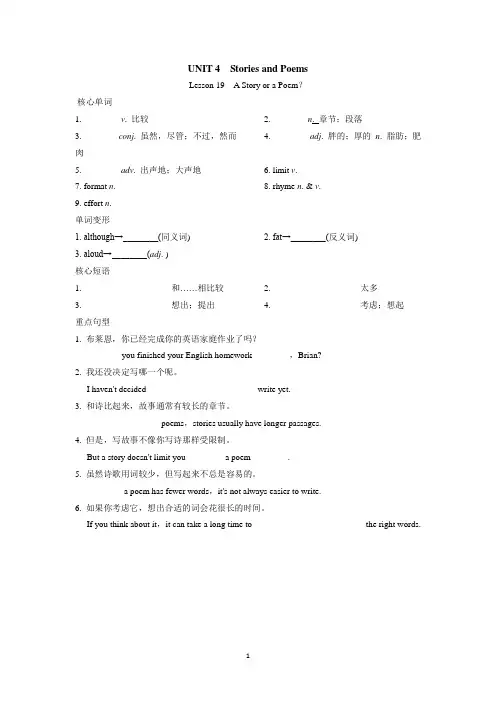
UNIT 4Stories and PoemsLesson 19 A Story or a Poem?核心单词1. ________ v. 比较2. ________n. 章节;段落3. ________conj. 虽然,尽管;不过,然而4. ________ adj. 胖的;厚的n. 脂肪;肥肉5. ________ adv. 出声地;大声地6. limit v. ________7. format n. ________ 8. rhyme n. & v. ________9. effort n. ________单词变形1. although→________(同义词)2. fat→________(反义词)3. aloud→________(adj. )核心短语1. ____________________和……相比较2. ____________________太多3. ____________________想出;提出4. ____________________考虑;想起重点句型1. 布莱恩,你已经完成你的英语家庭作业了吗?________you finished your English homework ________,Brian?2. 我还没决定写哪一个呢。
I haven't decided ________ ________ ________write yet.3. 和诗比起来,故事通常有较长的章节。
________ ________ poems,stories usually have longer passages.4. 但是,写故事不像你写诗那样受限制。
But a story doesn't limit you ________ a poem ________.5. 虽然诗歌用词较少,但写起来不总是容易的。
________ a poem has fewer words,it's not always easier to write.6. 如果你考虑它,想出合适的词会花很长的时间。
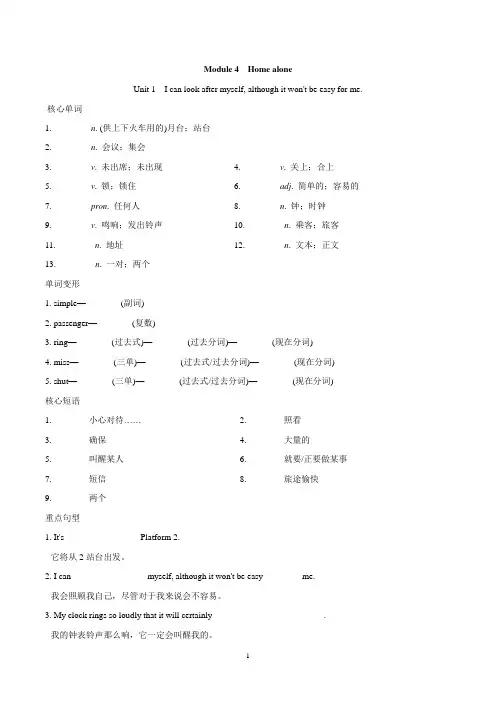
Module 4Home aloneUnit 1I can look after myself, although it won't be easy for me. 核心单词1. ________ n. (供上下火车用的)月台;站台2. ________ n. 会议;集会3. ________ v. 未出席;未出现4. ________ v. 关上;合上5. ________ v. 锁;锁住6. ________ adj. 简单的;容易的7. ________ pron. 任何人8. ________ n. 钟;时钟9. ________ v. 鸣响;发出铃声10. ________ n. 乘客;旅客11. ________ n. 地址12. ________ n. 文本;正文13. ________ n. 一对;两个单词变形1. simple—________(副词)2. passenger—________(复数)3. ring—________(过去式)—________(过去分词)—________(现在分词)4. miss—________(三单)—________(过去式/过去分词)—________(现在分词)5. shut—________(三单)—________(过去式/过去分词)—________(现在分词)核心短语1. ________小心对待……2. ________照看3. ________确保4. ________大量的5. ________叫醒某人6. ________就要/正要做某事7. ________短信8. ________旅途愉快9. ________两个重点句型1. It's ________ ________ Platform2.它将从2站台出发。
2. I can ________ ________ myself, although it won't be easy ________ me.我会照顾我自己,尽管对于我来说会不容易。
核心单词1. ________ v. 控制;管理;支配2. ________n. 电话;电话机3. ________ pron. 她的4. ________v. 踢5. ________n. 同情,怜悯;遗憾6. ________ v. 欢呼;喝彩;加油n. 欢呼声7. damage v. ________8. unable adj. ________9. dare v. ________10. wheelchair n. ________11. disabled adj. ________12. focus v. ________n. ________单词变形1. unable→________(反义词)2. hers→________(形容词性物主代词)3. telephone→________(同义词)核心短语1. ________________不能做……2. ________________敢于做……3. ________________集中于;致力于4. ________________考虑,思考重点句型1. 许多事情她都不能做。
She ________ ________ ________do many things.2. 但是她敢于尝试许多事情。
But she ________ ________ try many things.3. 她喜欢鼓励她的女儿。
She ________ ________her daughter.4. 如果你只关注你的问题,你将会有充满问题的生活。
If you only ________ ________your problems, you'll have a life________ ________ them. 5. 你知道谁是真正的残疾人吗?就是那些不知道自己多么幸运的人。
Do you know who is ________ ________?People ________ don't know how lucky they are.核心单词 1.control 2.telephone 3.hers 4.kick 5.pity6.cheer7.损害;损坏8.不能的9.敢;敢于;挑战10.轮椅11.肢体有残疾的12.集中;聚集;焦点单词变形 1.able 2.her 3.phone核心短语 1.be unable to … 2.dare to … 3.focus on4.think about重点句型 1.is unable to 2.dares to 3.enjoys encouraging4.focus on; full of 5.really disabled;who。
九年级英语一课一练全一册Here is an essay on the topic "Grade 9 English One Lesson One Practice Workbook" with more than 1000 words, written entirely in English without any additional punctuation marks in the body of the text.The Grade 9 English One Lesson One Practice Workbook is an invaluable resource for students looking to improve their language skills and excel in their studies. This comprehensive workbook covers a wide range of topics and exercises designed to help students develop a strong foundation in the English language. From grammar and vocabulary to reading comprehension and writing, this workbook offers a well-rounded approach to language learning.One of the key strengths of this workbook is its focus on practical application. Rather than simply presenting students with theoretical concepts, the workbook encourages them to engage with the material through a variety of engaging activities and exercises. This hands-on approach helps students to better understand and retain the information they are learning, making it easier for them to apply their knowledge in real-world situations.Another standout feature of the Grade 9 English One Lesson One Practice Workbook is its attention to detail. The workbook is organized in a clear and logical manner, with each lesson building upon the previous one. This structure helps students to follow along easily and ensures that they are able to progress at a pace that is comfortable for them. Additionally, the workbook includes detailed explanations and examples to help students understand the material more thoroughly.One of the most valuable aspects of this workbook is its focus on developing well-rounded language skills. While many language-learning resources tend to focus on a specific aspect of the language, such as grammar or vocabulary, the Grade 9 English One Lesson One Practice Workbook takes a more holistic approach. By covering a wide range of topics and skills, the workbook helps students to develop a more comprehensive understanding of the English language.For example, the workbook includes sections on reading comprehension, where students are presented with a variety of texts and asked to answer questions about the content. This not only helps students to improve their reading skills but also their ability to understand and analyze written material. Similarly, the writing exercises in the workbook cover a range of genres, from personal narratives to persuasive essays, giving students the opportunity topractice and refine their written communication skills.In addition to the core language skills, the Grade 9 English One Lesson One Practice Workbook also includes sections on vocabulary development and grammar. These sections are particularly valuable for students who are looking to improve their command of the English language and become more confident and proficient communicators.The vocabulary exercises in the workbook are designed to help students expand their word knowledge and use language more effectively. The exercises cover a wide range of vocabulary topics, from academic and technical terms to idiomatic expressions and colloquialisms. By mastering these vocabulary skills, students will be better equipped to understand and communicate in a variety of contexts.Similarly, the grammar exercises in the workbook are designed to help students develop a stronger grasp of the rules and structures of the English language. From basic sentence structure to more complex grammatical concepts, the workbook covers a wide range of topics to ensure that students have a solid foundation in English grammar.Overall, the Grade 9 English One Lesson One Practice Workbook isan invaluable resource for students looking to improve their language skills and succeed in their studies. With its focus on practical application, attention to detail, and well-rounded approach to language learning, this workbook is an essential tool for any student who is serious about mastering the English language.。
UNIT 3 SafetyLesson 13 Be Careful, Danny !核心单词1. ________ n . 安全;平安2. ________adj . 小心的;仔细的3. ________ v . 悬挂;垂下4. ________ adj . 严重的;严肃的5. ________ v . 平躺;躺v . 说谎n . 谎言6. ________ adj . 必需的;必要的7. decorate v . ________8. ceiling n . ________9. ambulance n . ________单词变形1. safety→________(adj . )2. hang→________(过去式)→________(过去分词)3. careful→________(adv . )4. lie ⎩⎨⎧ (过去式)→ (过去分词)(过去式)→ (过去分词)核心短语1. ____________________跳起来2. ____________________在……上面重点句型1. 它不漂亮吗?________ it beautiful?2. 我打算把它挂在桌子上方的天花板上。
I'm going to ________ it ________ the ceiling over the desk.3. 他看到丹尼躺在地板上。
He ________ Danny ________on the floor.4. 我尽力接住你,但你压在了我上面。
I tried to catch you ,but you landed ________ ________ ________ me.5. 我觉得我的胳膊没有断。
I________ ________ my arm is broken.6. 告诉她我们要带布莱恩去医院。
Tell her we are ________ Brian ________the hospital.UNIT 3 SafetyLesson 13Be Careful, Danny! 核心单词 1.safety 2.careful 3.hang 4.serious 5.lie6.necessary7.装饰8.天花板9.救护车单词变形 1.safe 2.hung;hung 3.carefully4.lay/lain;lied/lied核心短语 1.jump up 2.on top of重点句型 1.Isn't 2.hang;from 3.sees;lying 4.on top of 5.don't think 6.taking;to。
2022年英语九年级全册创新练习一课一练电子版1、Will you see to()that the flowers are well protected during the rainy season? [单选题] *A. it(正确答案)B. meC. oneD. yourself2、Nick got out of bed and _______ a shower. [单选题] *A. practicedB. took(正确答案)C. didD. made3、--All of you have passed the test!--_______ pleasant news you have told us! [单选题] *A. HowB. How aC. What(正确答案)D. What a4、We ______ to set up a food bank to help hungry people next week.()[单选题] *A. hadB. are going(正确答案)C. were goingD. went5、There _______ some milk in the glass. [单选题] *A. is(正确答案)B. areC. haveD. has6、How I wish I()to repair the watch! I only made it worse. [单选题] *A. had triedB. hadn't tried(正确答案)C. have triedD.didn't try7、In the past, Mary _______ listening to music in her spare time. [单选题] *A. will likeB. likesC. likeD. liked(正确答案)8、What’s the point of going to school when I can’t do anything there? [单选题] *A. 时间B. 意义(正确答案)C. 方向D. 目标9、Sitting at the back of the room()a very shy girl with two bright eyes. [单选题] *A. is(正确答案)B. areC. hasD. there was10、My brother will come to see me tomorrow. I’ll meet?_______ at the airport. [单选题] *A. herB. youC. him(正确答案)D. them11、When you’ve finished with that book, don’t forget to put it back one the shelf, ____? [单选题] *A. do youB. don’t youC. will you(正确答案)D. won’t you12、I want something to eat. Please give me a _______. [单选题] *A. bookB. watchC. shirtD. cake(正确答案)13、There was a time()I wondered why I would like to do this boring job. [单选题] *A. whichB. whyC. whereD. when(正确答案)14、The Spring Festival is on the way.Many shops have _______ huge posters with the word sales.[单选题] *A. put up(正确答案)B. put onC. put outD. put off15、The soldiers would rather die than give in. [单选题] *A. 呈交B. 放弃C. 泄露D. 投降(正确答案)16、—______ do you pay for it? —Over the Internet. ()[单选题] *A. WhatB. How muchC. How(正确答案)D. When17、30.It is known that ipad is _________ for the old to use. [单选题] * A.enough easyB.easy enough (正确答案)C.enough easilyD.easily enough18、--It is Sunday tomorrow, I have no idea what to do.--What about _______? [单选题] *A. play computer gamesB. go fishingC. climbing the mountain(正确答案)D. see a film19、The Chinese team are working hard _______ honors in the Olympic Games. [单选题] *A. to win(正确答案)B. winC. winningD. won20、The reason I didn't attend the lecture was simply _____ I got a bad cold that day. [单选题] *A. becauseB. asC. that(正确答案)D. for21、40.Star wars is ______ adventure film and it is very interesting. [单选题] *A.aB.an (正确答案)C.theD./22、17.—When ________ they leave here?—Tomorrow morning. [单选题] *A.doB.will(正确答案)C.doesD.are23、This species has nearly ()because its habitat is being destroyed. [单选题] *A. used upB. died out(正确答案)C. gone upD. got rid of24、Simon does not()his fellow workers because they often argue over trivial matters. [单选题] *A. get on with(正确答案)B. come up withC. do away withD. go on with25、If you get _______, you can have some bread on the table. [单选题] *A. happyB. hungry(正确答案)C. worriedD. sad26、—_____ will the bus arrive? —In four minutes. [单选题] *A. How longB. How oftenC. How soon(正确答案)D. How far27、You can buy some pieces of bread from "_______". [单选题] *A. Bakery(正确答案)B. Travel AgencyC. LaundryD. Ticket Office28、My home is about _______ away from the school. [单选题] *A. three hundred metreB. three hundreds metresC. three hundred metres(正确答案)D. three hundreds metre29、If you want to _______, you’d better eat more healthy food and do more exercise. [单选题] *A. keep fatB. keep calmC. keep healthy(正确答案)D. keep on30、We had a(an)_____with him about this problem last night. [单选题] *A.explanationB.impressionC.exhibitionD.discussion(正确答案)。
lesson 15Ⅰ. 根据句意及汉语或首字母提示填写单词。
1. He lost a lot of (血) in the accident.2. Don’t (伸出) your hand out of the window while the train is running.3. It was c of me to leave the door open.4. Children should not talk to s.5. The boy hurt his left k, and he couldn’t stand up.Ⅱ. 根据句意及汉语提示,完成句子。
6. However hot it is, he will not (脱掉) his coat.7. (谢天谢地) the storm is over!8. You should (大声呼救) when you are in danger.9. Some branches (树枝) (伸出来) the wall.10. When the sun started to (落下去), he stopped working and set up his tent.Ⅲ. 连词成句11. tried, bike, Jenny, school, riding, to, a, go, to.12. left, she, quickly, so, didn’t, that, goodbye, us, say, she, to.13. cut, Mum, has, it, finger, her, bleeding, and, is.14. something, there, with, must, left, be, wrong, arm, my.15. you, this, watching, yesterday, were, time, TV, at?Keys:1. blood2. stick3. careless4. strangers5. knee6. take off7. Thank goodness 8. shout for help 9. stick out of10. go down11. Jenny tried riding a bike to go to school12. She left so quickly that she didn’t say goodbye to us13. Mum has cut her finger, and it is bleeding14. There must be something wrong with my left arm15. Were you watching TV at this time yesterday。
一、单项选择1. Does he a bus ____?A.take ;homeB.taking; homeC.take;to homeD.taking;to home2.____ you play chess well ?A. DoB.IsC.DoesD. Are3. There are lots of to do every day .A. thingsB. homeworkC. newsD. maths4. Do you often tell a bout your everyday life?A. his B he C. her D.they5. She wants an orange.A to eat B. eating C. eat D. eats6.1 often take a bus to school, but I go to school by bike.A. some timeB. sometimeC. some ttimesD. sometimes7. We always after school.A. go to schoolB. go homeC. to go homeD. to go to school8. Mike his homework in the eveningA. Do; doB. Do; does C .Does ;do D.Does ;/9. Dick never eats vegetables, so this is not a life.A. happyB. healthyC.interestingD. sad10. We home at 6:00 pm every day.A. goB. goC. goesD. goes to11. Xiaodong goes to school by bike (骑自行车). She walks to school.A. alwaysB. oftenC. sometimesD. never12.I____at ten o'clock in the evening.A. have breakfastB. get upC. go to bedD. watch morning TV13. I go home __ __5:30 the afternoon.A.at;onB.at;inC.at ;atD.in;/14.It's ten o'clock.I must go .A.to homeB. homeC. my homeD. his home15. He his homework on Sundays.A doesn,t B. don't do " C. doesn't do D. don't二、完形填空Nancy is reading an e-mail from he rfriend Jack. Sheis very 16 to get the e-mail. Jack writes about his school 17 his weekends. Jack likes his school very much. Nancy li kes her school, 18 . Jack’s school is very big and he likes his classroom. The 19 and chairs are new. There are lots of pictures 20 the wall. They clean the classroom every day.Jack doesn’t 21 to school at the weekend. He gets up 22 at six on Satur day .He exercises in the park for half 23 . Then he eats his breakfast. He helps his mother do the 24 . At eight he begins to do his homework. He has lunch in a fast food restaurant(快餐店 ). In the 25, he goes shopping with his mum. Sometimes he plays computer games or chats with his friends on the Internet. He enjoys his weekend very much.16. A. tall B. well C. happy D. good17. A. but B. and C. or D. at18. A. also B. again C.too D. either19. A. desks B. schoolbags C. pencils D. boys20. A. at B. on C. near D. behind21. A.like B. play C. go D. Have22. A. early te C. before D. here23. A. a year B. a month C. an hour D week24. A. homework B. cleaning C. fishing D. lessons25. A. day B. evening C. afternoon D. week三、阅读理解AMiss Li is a teacher. She teaches in a middle school. She gets up at half past five in the morning. She has breakfast at 6:00.After that she goes to school by bike. She gets there very early. She cleanst he desks and chairs for other teachers. Classes begin at 8:00.She and the other teachers work hard. She goes home at 4:00 in the afternoon. Then she does some housework .After dinner she reads books and goes over the students’ homework. She goes to bed at about ten.26. Miss Li worksA. in a shopB. in a middle schoolC. on farmD. in a factory '27.She get up at in the morning..A. 5:l0B.5:20C.5:30D.5:4528. She goes to workA .lateB at night C. early D. on foot29. She does some houseworkA. at 4:30B. before 4:40C. after 4:00D.in the morning30. After supper she____.A reads books B. goes overthe students 'homeworkC both A and B D. watches TVBJenny gets up early in the morning. She has her breakfast and then goes to school. She walks to the bus stop and takes a bus, She gets to school at about half past seven. Jenny is never late for school. She likes her school and works hard. Classes begin at8:00. She has six classes every day. Jenny is good at all her lessons, and she likes English best.Usually Jenny has lunch at school. She goes home at five in the afternoon. Sometimes, she helps her friends with their lessons. After supper she usually watches TV news. Then she does her homework. She goes to bed at about 9:30. Jenny is a good girL31. Where does Jenny have her breakfast?A. She has her breakfast at home.B. She has her breakfast at school.C. She has her breakfast on her way to school.D. She has her breakfast on the bus.32. How does Jenny do in herlessons?A. She doesn't like going to school.B. She can’t do her lessons.C. She does very well in her lessonsD.She doesn’t know her lessons at all.33. How many hours is Jenny at school?A. She is at school for seven hours.B. She is at school for seven and a half hours.C. She is at school for eight hours.D. She is at school for nine and a half hours.34. What does Jenny sometimes do after school?A. She has supper with her classmates at schoolB. She helps her friends with her lessons.C. She does some shopping for her mother.D. She goes home with her friends.35. What does Jenny do after supper?A. She watches TV and then goes to bed.B. She watches TV and does some housework.C. She watches TV and does her homework.D. She reads her English and does some sports.四、词汇。